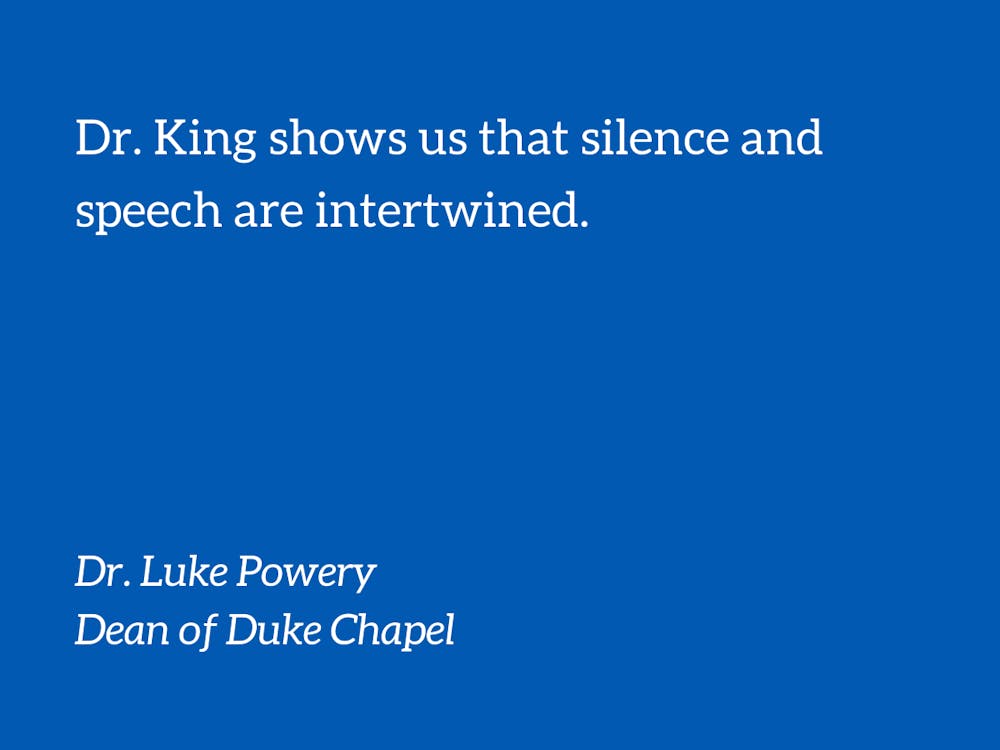When people think of the Rev. Dr. Martin Luther King, Jr., they may think of what he said—especially, “I have a dream.” Those famous words come from an unforgettable speech delivered before the Lincoln Memorial on August 28, 1963, at the March on Washington for Jobs and Freedom. Dr. King was certainly a gifted orator rooted in the Black Church tradition, but what people sometimes overlook is that his prophetic speech had deep roots in an inconspicuous source: silence.
Dr. King organized, marched, preached and prayed. It’s the latter that is not usually discussed when we talk about his legacy, but the life and work of Dr. King reveal that prayerful listening leads to prophetic proclaiming. He was a "drum major for justice" but that drumbeat had a spiritual foundation.
In his book "Never to Leave Us Alone," Vanderbilt University historian Lewis Baldwin does a study of the prayer life of Dr. King. Baldwin argues that prayer was the “secret [nonviolent] weapon” of the civil rights movement. Dr. King took “days of silence” and what we discover through his legacy is the interrelationship of prayer and protest. His prophetic work for justice and love was propelled by the posture of listening.
As easy as it sounds, it can be hard to listen due to what the theologian Howard Thurman calls the “jangling echoes of our turbulence.” Thurman, whose writing had a significant influence on King, is talking about what we now experience as all the voices on social media clamor for our attention. We may hear but that doesn’t mean we are listening.
One example of this occurs in the Bible during the childhood of Samuel who would become a great prophet of ancient Israel. When Samuel is still a boy, God speaks and calls his name "Samuel!" four times, but three of those times Samuel thinks it’s the elder priest Eli who is calling him. It’s not until the fourth time that Samuel responds to God’s call with "Speak, for your servant is listening." Through these words, this future prophet reveals that listening is actually the first task of a prophet, not speaking.
Another example closer to our own place and time came during an unusual concert. On August 29, 1952, David Tudor walked onto the stage of the Maverick Concert Hall, near Woodstock, New York. He sat down at the piano, and, for four and a half minutes, made no sound. He performed “4'33″,’’ a conceptual work by musician John Cage. Some have called it the “silent piece,” but its purpose is to make people listen. Cage didn’t believe there was such a thing as silence because one could hear other sounds during that piece—the wind, raindrops and people talking or walking out. Many didn’t really care for this musical experiment, including his own mother who thought he went too far. Expectations were not met but it may also be the case that people just have a hard time centering down in silence.
Silence, though, may be a corrective to a word-centered spirituality that believes that the number of words reveals how deep one’s spirituality is. Perhaps, we need an ear-centered theology that recognizes listening as much as speaking since, as the Apostle Paul writes, “faith comes by hearing.” When we listen, we indicate our intellectual and spiritual humility. When we listen, we show that we don't have all the answers and need guidance.
My emphasis on listening doesn’t mean we never act because even prophets, like Samuel, eventually speak up. Listening gives birth to speech; prophetic words arise out of silence. Even Dr. King, in a speech about the Vietnam War in 1967 at New York City’s Riverside Church, said there comes a time to “break the silence.”
Dr. King shows us that silence and speech are intertwined. The roots of social and civic engagement are grown through listening. As the Harlem Renaissance writer and civil rights activist James Weldon Johnson poetically put it, we should “pin our ear to the wisdom post.” Or, as the proverb goes: a still tongue makes for a wise head.
So, speak up, but never forget to listen.
The Rev. Dr. Luke A. Powery is Dean of Duke University Chapel. His column runs on alternate Mondays.
Get The Chronicle straight to your inbox
Signup for our weekly newsletter. Cancel at any time.

